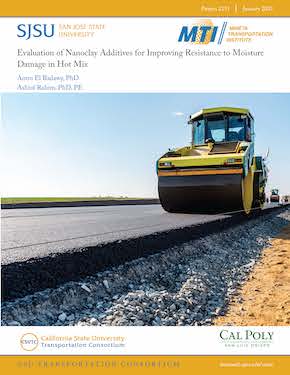- 408-924-7560
- mineta-institute@sjsu.edu
- Donate
Evaluation of Nanoclay Additives for Improving Resistance to Moisture Damage in Hot Mix
Transportation has an enormous impact on the U.S. economy and on the lives of all Americans. Many modes of transportation rely on pavement, but pavement conditions deteriorate over time because of the combined effects of traffic and climate. Exposure to moisture often causes premature failure of asphalt pavements as it reduces the stiffness of the asphalt and enables stripping of the asphalt from the aggregate. This research evaluates the effectiveness of clay nanomaterials (i.e., nanoclays) in improving the resistance of hot mix asphalt (HMA) to moisture damage and compares the enhancement results to anti-stripping additives commonly used in pavement construction. Two types of surface-modified nanoclay, lime-treated aggregate, and two amine-based liquid antistripping agents (HP Plus and LOF 6500) were evaluated for improving HMA’s moisture resistance. All additives tested for reducing moisture damage resulted in dry and wet tensile strength of the modified mixes higher than the minimum specified by Caltrans 2018 Standard Specifications (100 psi for dry tensile strength and 70 psi for wet tensile strength). The Tensile Strength Ratio (TSR) of all HMA modified mixes was higher than 0.80, which is the minimum specified by the Superpave mix design method (Asphalt Mix Design Methods MS-2, Asphalt Institute) and exceeded the TSR of the control mix. The TSR for HMA mixes modified using nanoclays were comparable to those for HMA mixes modified using liquid antistripping and lime slurry treated aggregate. Liquid antistripping agents tested herein were the least costly additive at an approximately $2.0/ton added cost. This research can be used to better understand pavement deterioration to enable the most efficient and cost-effective construction and preservation of our nation's critical transportation infrastructure.
AMRO EL BADAWY, PHD
Dr. Badawy is an Assistant Professor in the Civil and Environmental Engineering Department at California Polytechnic State University. He has twelve years of experience conducting research on the synthesis, applications, and implications of engineered nanomaterials. He has more than fifteen publications in this field.
ASHRAF RAHIM, PHD, PE
Dr. Rahim is a Professor in the Civil and Environmental Engineering Department at California Polytechnic State University. He has extensive experience in research addressing pavement materials characterization, cement-treated bases, and the performance of rubberized asphalt. He led the development of pavement performance models for several pavement types, which were implemented in the Mississippi DOT pavement Management System (PMS). He led two Caltrans research projects to analyze the effectiveness of Crack seal and Overlay rehabilitation in California. These studies led to the development of prediction performance models for this type of rehabilitation technique. He was the co-author of the subgrade soil stabilization guide prepared for Caltrans in collaboration with UCPRC and CSU, Long Beach. In collaboration with CSU, Long Beach and CSU, Chico, Dr. Rahim evaluated the performance of Chip Seals pavement preservation for sections throughout California.
-
Contact Us
San José State University One Washington Square, San Jose, CA 95192 Phone: 408-924-7560 Email: mineta-institute@sjsu.edu






